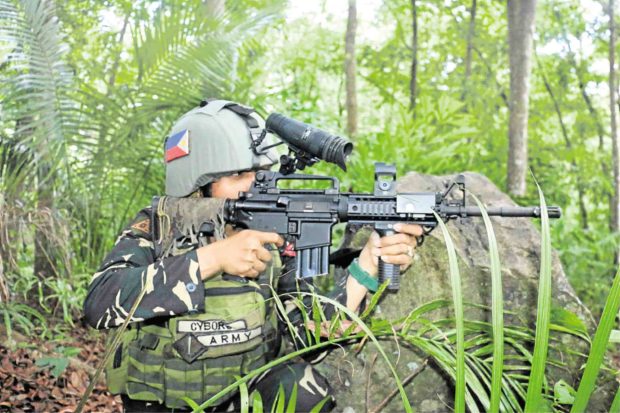
COMBAT POSITION A female sniper from the Army’s 1st Infantry Division looks for the enemy from her post.—ARMY PHOTO
MARAWI CITY—Under a drizzle, 1st Lt. Sarah Jane Bagasol patiently waited for the signal man for clearance to drop the 4.5-kilogram shell she was holding into the 81-millimeter mortar.
She got it and seconds later there was a loud explosion.
The spotter, on an elevated position, radioed a direct hit on the target—a house some 800 meters away, where Maute gunmen had taken shelter that day.
Bagasol, 26, is one of seven female soldiers in the Army’s 1st Infantry Battalion, which was plucked out of Luzon on June 1 to fight the Maute group and its allies in Marawi.
One of their tasks is to provide indirect combat support during special operations, such as taking down an enemy lair.
Education graduate
Being an Army soldier was farthest from her mind though she completed the Reserve Officers Training Course (ROTC), Bagasol told the Inquirer.
She obtained an education degree from the state-run University of Southern Mindanao in Kabacan, North Cotabato province.
She passed the licensure examination for teachers, hoping to land a permanent teaching position in a public school.
“I wanted to have a stable job. Then my former ROTC commandant told me that I should probably try entering the Army. He told me that soldiery is the noblest profession and, in jest, added that there is no capital involved in it except your life,” she said.
When she failed to get a plantilla position even after several months of teaching in a public school, Bagasol followed her former commandant’s advice. She applied with the Army’s 2nd Infantry Division based in Tanay, Rizal province.
First combat experience
Bagasol was commissioned a second lieutenant and assigned to the 1st Infantry Battalion, then based in Infanta, Quezon province.
In her sixth year of soldiering, her entire battalion was sent to Marawi on June 1.
Like Bagasol, Pvt. Anjanette Mayang, 23, gives indirect combat support as a gunner, handling 81-mm and the smaller 60-mm mortars, and joins battle operations.
Barely into her first year in service, Mayang, a native of Laguna province, said the Marawi crisis was her first actual combat experience.
“I took ROTC while in college and decided to be formally drafted into the Army. I graduated with a criminology degree in 2016 and applied to the 2nd Infantry Division,” she said.
Mayang, the eldest in a brood of eight, said her father, a security guard, and her mother told her they were proud of what she was doing here.
Fighting with men
She also draws strength from the plight of women and children who fled Marawi and are now in evacuation centers. “They also serve as my inspiration to continue fighting even with the risk of enemy fire hitting me,” she said.
When they were not at their mortar posts, the female soldiers join their male comrades in actual combat and exchange fire with the enemies.
“I also get nervous, but this is combat. What the male soldiers experience, we also get to experience,” Bagasol said.
In combat, she said, men and women are in the same boat. “We fight during wars and we serve in other ways when there is peace.”
Mayang said her being a woman had not hindered her from performing her job. While she is happy to serve, it saddens her to learn that women are also fighting on the side of the Maute group.
Reports about female Maute snipers first surfaced during the early days of the fighting.
Target of snipers
“Recently, we have also become the target of enemy snipers. We were conducting mortar fire along with our battalion commander (Lt. Col. Christopher Tampus) and we were targeted,” Bagasol recounted.
Pantao Ragat Mayor Lacson Lantud, whose half-brother Hata is among the terrorists, said his sibling had told him about having female fighters there.
“They’re fighting for a lost cause,” Mayang said. “My message to them is to return to the fold of the law and not add to the suffering of the people.”
Bagasol said she did not regret her decision to become a soldier.
“I was shaped into a better person, who is capable of doing things beyond what was thought of me. I am now a more critical thinker, more optimistic, more responsible and tough,” she said.
Model for youths
She said she was able to meet and befriend many people, and had helped more because of her job. “It also feels great to know that many people, especially the youth, are now looking up to me as their model.”
Being in the Army also made her experience how to help the needy, especially during medical and dental missions, relief operations, Army-led, gift-giving activities and feeding operations.
“That’s why even if I am far from my family, I did not lack love and care because of people I have helped,” Bagasol said.
“My sworn job, serving the people, securing the land,” she said.